As the light outside starts to dim, and Wellington’s office workers make their dreary way homewards from the city, the day is over for many people.
At Parliament, numbers have thinned out and the press gallery have largely gone home to monitor Twitter, but a world of work is just beginning.
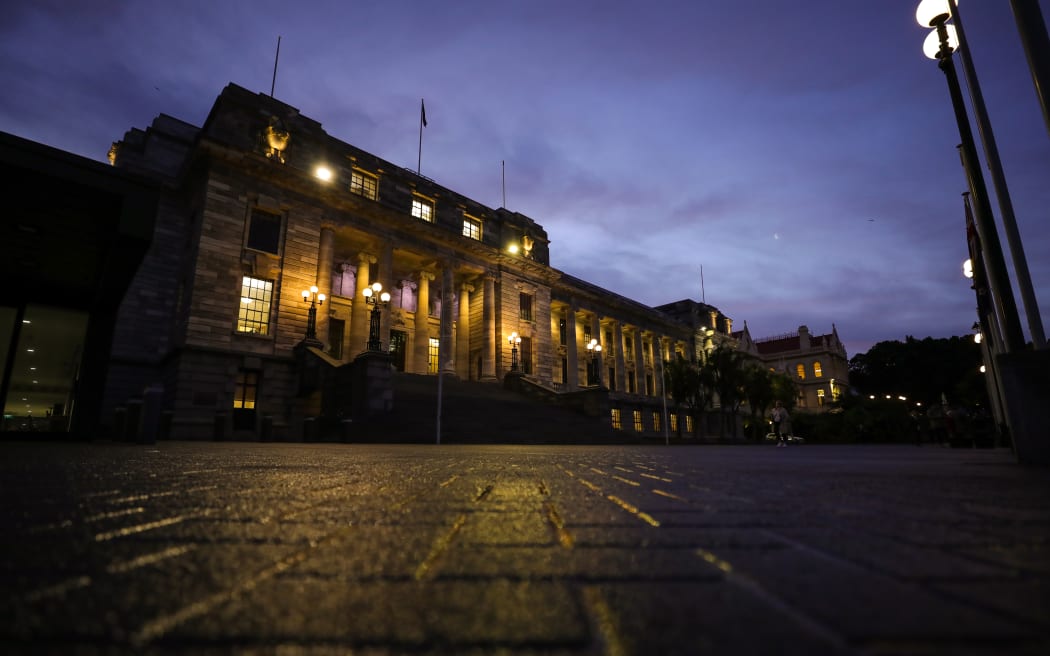
Photo: VNP / Daniela Maoate-Cox
As 7pm approaches, having paused for dinner, a gaggle of MPs slowly drift back into the chamber. It’s a low-key resumption, a far cry from the theatrics of Question Time earlier in the day.
Usually there are a lot more empty seats in the chamber during the night than there are during the day. Throughout the evening MPs are often working in their offices, and deploy to the chamber when necessary.
“Unless you’ve got leave, while Parliament’s sitting we have to be here on precinct. No shooting across the road to the Backbencher,” explained Labour MP Greg O’Connor.
“While it might look like there's not much happening, an incredible number of meetings are taking place, like on a Tuesday or Wednesday night I'll be meeting with ministers regarding select committees, depending on which select committee you’re on. And people will be coming and going from those meetings and will be keeping an eye on the screen on the TV to see when they're up, how quickly bills are going through or when their duty is on.
“I liken it to an ant hill. You cut an ant hill in half and there’s all these ants scurrying around. You can't put another ant in there because it'll get eaten. People are going in a lot of different directions, but they know where they’re going,” he said.
Vibes in the chamber at night are usually quite different to the day. MPs are often considering the finer points of legislation, and while the pace is less frenetic and there may only be a dozen or so members in the chamber, debate can be intense. Especially during the committee stages of end-of-life legislation and abortion law reform legislation, debates were high on energy running late into the night.
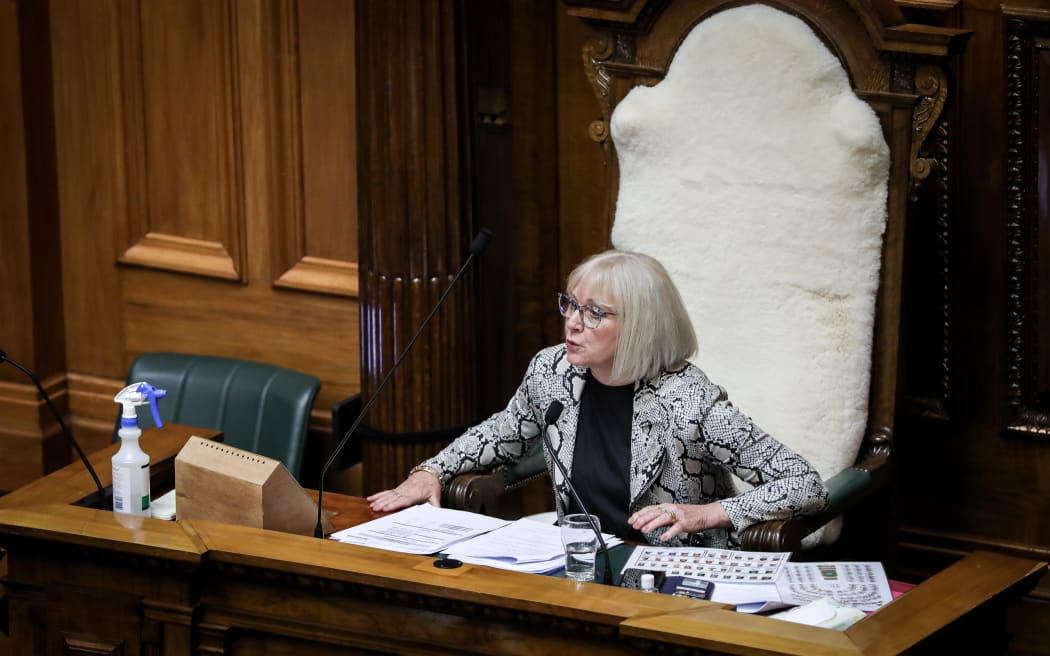
Assistant Speaker Jacqui Dean Photo: ©VNP / Phil Smith
According to Assistant Speaker Jacqui Dean, who sometimes runs the House during the evenings, speeches during the evening offer free range for the MP who is passionate on their subject.
“Certainly the energy is different than at Question Time. Because at Question Time rather than the Opposition, who get to ask the questions, and the government members (who get to ask questions) are really in the main just reading a script, and then the Government has more or less free-range, whereas in the evenings members have free range.
“So if you’re making any kind of speech in the evening you just go for it. The timing is set but it’s what the MP does within that timing, how they treat that opportunity within the rules is what makes debating exciting in the evenings,” she said.
In the chamber at night, strange blunders happen. In recent times, those watching on have been treated to spectacles such as Gerry Brownlee in a delirium over mysterious voices he heard but couldn’t work out where they came from (it was a Green MP participating on Zoom with no picture); Statistics Minister David Clark getting hopelessly tangled up while trying to take his mask off to speak; Trade Minister Damien O'Connor repeatedly forgetting a key word in his own legislative statement and being corrected; and Nicola Grigg almost choking on a fruit burst as she took the mic.
Finally free from the constraints and pressures of the day, MPs can loosen up or simply be more their pure selves. Things might get peculiar at any old time and sometimes you don't see it coming, Dean said.
“Sometimes, the level of frustration might just boil over and I think that as as we get tireder in the evening then, occasionally, members can just get frustrated and at that point, as a presiding officer, I have to go ‘okay let's calm the farm, let's just get things back’, and I do think tiredness does have an impact sometimes on people's tolerance and reaction to things. You know if you’ve got a short fuse and you are really frustrated by the debate, sometimes people can blow their top.”
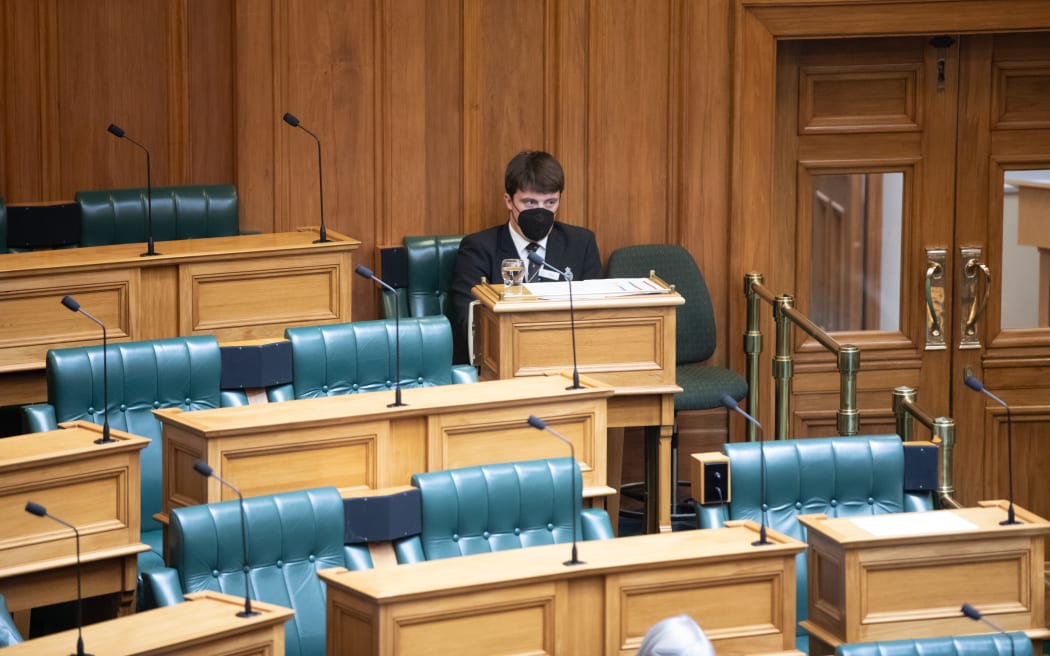
Parliament Chamber Officer Finn Meredith sits at the back of the chamber on a quiet evening session. Photo: VNP / Johnny Blades
Late hours
It’s not just MPs for whom the night can go long indeed. Spare a thought for Chamber Officers such as Finn Meredith who are part of a team always on hand to ensure Parliament is able to conduct its business smoothly.
“During all the euthanasia debates, some nights we worked until 1:30 am. Because so many members had amendments they wanted to the bill, there was 200 amendments or something. So it was voting after voting after voting, so we were just there until the end.
“Those euthanasia nights, where they're on their feet all the time the odd one might take a five-minute power nap on the sofas we got before getting back in there and continuing to work. They’re just normal people, they get tired and we get the job of watching them sleep - but it doesn't happen often,” Meredith said.
As the night drags on, the committee stage of a bill can involve painstaking work on small details. And when there are lots of amendments proposed it requires help from the House Office, the hub of information that MPs and the presiding officers of the House require to conduct the work of Parliament.
“You’re not entirely sure what’s going to come your way. Often there are fewer people around, so your opportunity to bounce ideas off people, to test your thinking, is reduced, and you’re also having to make decisions really quickly,” explained Pav Sharma, the manager of the House Office, whose team’s work at night follows the rhythm in the chamber.
“It’s like a mirror to whatever’s going on in the House. So if the chamber is being hectic, if there’s a lot of contention in a bill, if people are wanting to put up amendments to a bill or raising points of order, that temperature in the chamber can really permeate through to the House Office, and we're having to provide quick advice, turn things around really quickly, maybe copying documents to get them into the chamber as soon as possible, and that atmosphere can be quite thrilling, but it could also be stressful.”
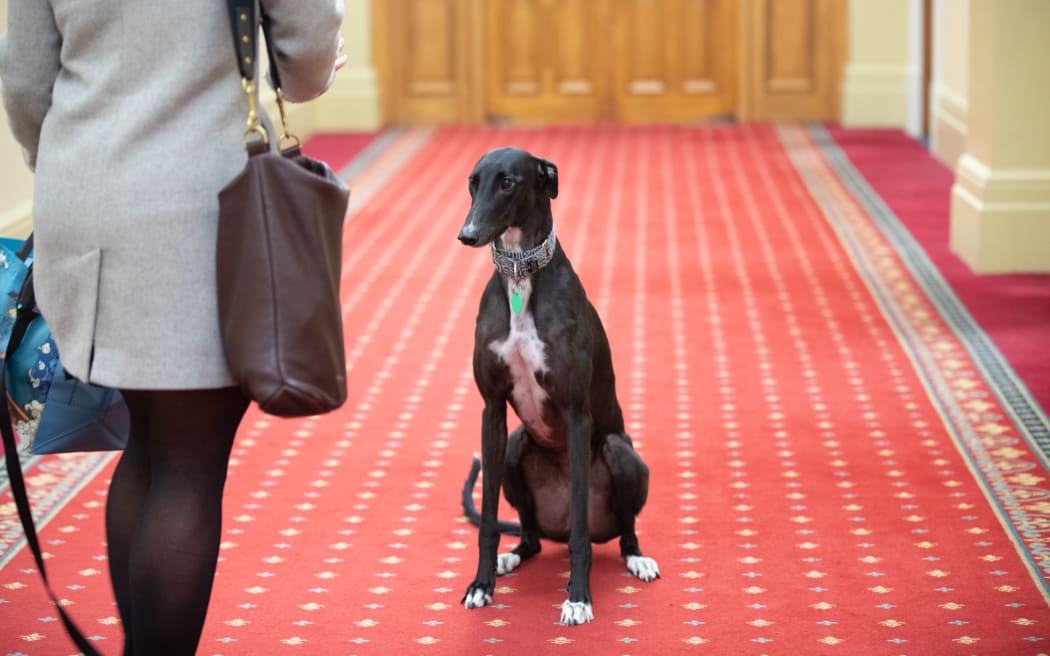
MP Kieran McAnulty's dog Zoi is a friendly face in the corridors of Parliament at night. Photo: Johnny Blades / VNP
In the later hours, activity in the chamber can occasionally resemble the end of a wake, where the remaining participants run out of booze to drink and new things to say.
It’s not uncommon for particular members to speak a lot during the committee stage of a bill. For the poor Hansard staff who are there to transcribe everything, it means that for a while they can get drawn into a loop with the same old MP.
Andrea O’Brien of the Hansard team said that MPs were mostly more relaxed in the nights which generally felt calmer as there are fewer people on precinct.
“But for us in Hansard we are still trying to get the first draft of all speeches to members and published on the website as quickly as we can, so it’s still full steam ahead for us.
“You definitely get more tired working at night, but we also work long hours, which also makes you tired. You get used to the long nights, except when [the House is sitting under] urgency and it goes on for more than a day.”
Everyone has their own way of coping with the late working hours, and cleaners have been known to stumble across sleepy MPs and staffers, not to mention other configurations of the aforementioned, while cleaning. The smart ones pop out the door for fresh air.
I initially mistook ACT MP Karen Chhour for a corporate taxi driver puffing on a vape outside the back door of Parliament while waiting for a passenger, but if it weren’t night time I probably wouldn’t have met her.
“There’s a whole different vibe to the place. There’s hardly anyone around in the corridors, just the security guards,” she said.
“And it’s a time where you’re probably spending more time in the office than during the day - catching up on reading, going through the bills that are coming up, looking at select committees that might be coming up that week and reading through the documents you need to. It’s a lot easier (at night), because you’re not having to work with the team like you are during the day, getting ready for Question Time. Things like that can take up quite a bit of time during the day.”
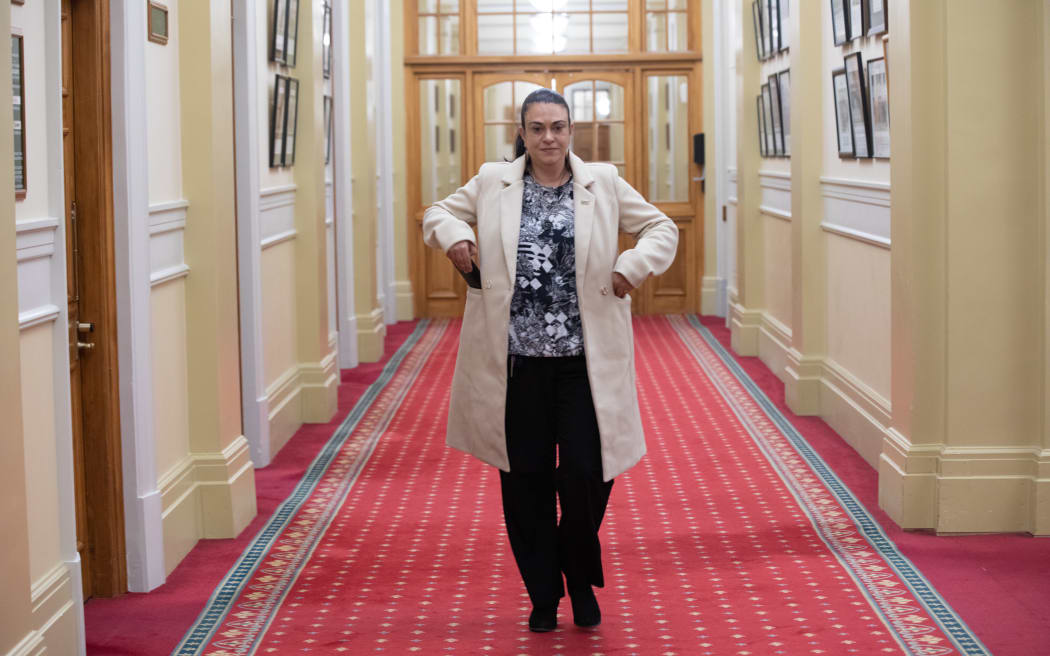
ACT Party MP Karen Chhour walks down a quiet corridor at Parliament at night. Photo: Johnny Blades / VNP
Back in the chamber, Chhour acknowledges the different energy.
“It’s a time to listen to what others have to say, and take on board the different opinions. I think it’s a little bit less antagonistic really.”
Night shifts
Parliament is alive by night on non-sitting days too. If you wander past in the evening you may see the lights on in many rooms - perhaps for a caucus meeting, a public function, an MP club having a soirée, cleaners doing their thing, or simply someone getting some concerted mahi done.
The place is never totally empty. There are always security staff posted around the precinct.
“We’ve always got to remain vigilant here because Parliament is a magnet for a lot of people with issues and things like that,” said Finn O’Keefe, the acting manager of Security Operations at Parliament.
“We've always got to be keeping an eye out just to make sure everything runs smoothly and that no one disrupts especially the House proceedings. Quite a bit of stuff happens at night, I guess. Outside on the grounds at night is when you tend to get the, say, intoxicated people sort of wandering through, and you’re never sort of sure what they can get up to.
“Overnight one time was when we had Greenpeace get up onto the roof of Parliament and unveil their banners. So we’ve always got things like that on the back of our mind,” O’Keefe said.
The illegal occupation of Parliament grounds earlier this year was a new kind of round-the-clock challenge for the security staff. They handled themselves well in the face of sustained hostility from unhinged elements. People who live nearby recall some of the strange screams throughout the night from the Freedom Camp, with concern for the children involved.
There's a feeling that security workers are now appreciated more than ever by other people at Parliament. O’Keefe said that at night it’s not uncommon for MPs and other staff to stop and chat to security workers, "you get to know them, and you even make some friendships along the way".
"So (at night) it's not that sort of full-on go that you’ve got during the day… everyone’s just sort of going about their business and you sort of fall in tune with everyone. Everyone’s a bit more relaxed, and it’s quite nice actually.”
This is echoed by Greg O'Connor who feels Parliament is a friendlier place at night.
“Because we're all here, we're all in the same boat and we're all basically shift workers then. The day workers have gone and so you can actually recognise people a lot more, and I think there is that real mutual recognition here, that we're all here until late tonight so let's get on with it.”
It’s in these late hours that one gets a good sense of the many different parts of Parliament that make it function. Kind of like a busy network of ants, only human.
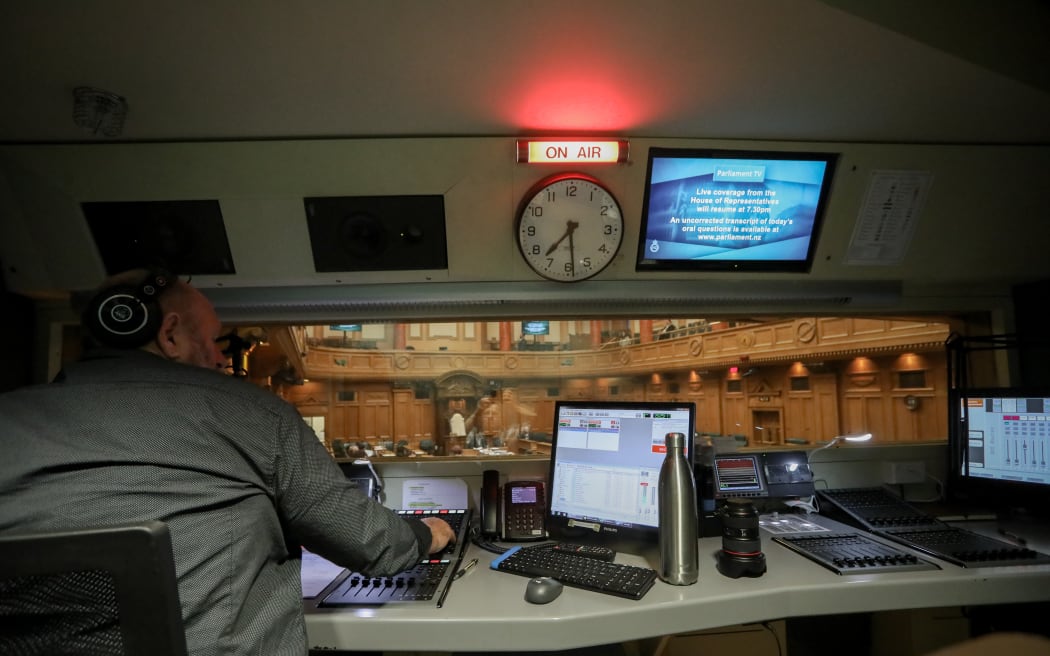
RNZ operator Colin Pearce leans into Parliament's evening sitting. In the audio booth he controls the debate audio for radio, TV and the chamber. Photo: VNP / Phil Smith

